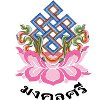Tame your own mind
Guru Rinpoche Day
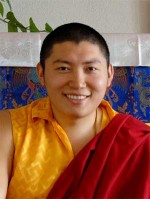 Dear Friends Near and Far,
Dear Friends Near and Far,
Greetings to you all on this Guru Rinpoche Day. Wherever you are and in whatever situation you are in, I truly hope that you are genuinely happy and healthy and that your karma never runs out and take you away from this current state.
I am by the way, in the Kathmandu Valley and presently, pleasantly happy and a little bit busy presiding over the Hundred Diety puja. Today is the 4th day of the 9-day/24 hour puja. And while sitting in the puja, I was checking in and out thinking of what to write for today’s GRD message. Lately I’ve been reading a series of question/answers between the Lotus Born and his Tibetan consort, Khandro Yeshe Tsogyal and then thought of sharing one such with you all.
During the fifty-five years that Guru Rinpoche remained in Tibet, Khandro Yeshe Tsogyal, his peerless student, served him as the most devoted and diligent attendant. Without exception, he bestowed upon her the entire extract of his oral instructions, and the essence of his wisdom. During this time, she collected and committed to writing all the teachings that he gave and kept them concealed as precious treasures.
She said, ‘on different occasions, he gave advice on dharma practice that I persistently retained in my perfect recall, collected and wrote down for the sake of future generations. Since they were not meant to be spread at the present time, I concealed these teachings as a precious treasure. May they meet with worthy and destined people’.
She goes on to say, “this ‘Cycle of Teachings Through Questions and Answers’ was committed to writing in the upper cave at Chimpu on the twenty fifth day of the second moon of fall in the year of the sow”.
An extract of a teaching from this particular terma treasure called Cycle of Teachings Through Questions and Answers:
Master Padma: When practicing the Dharma, you must first tame your own mind.
Lady Yeshe Tsogyal: What does that mean?
Master Padma:
You must extinguish the scorching flames of anger with the water of loving-kindness.
You must cross the river of desire on the bridge of powerful remedies.
You must light the torch of discriminating knowledge in the darkness of stupidity.
You must crumble the mountain of pride to the ground with the pestle of diligence.
You must overcome the storm of envy by wearing the warm garment of patience.
In any case, these five poisons, your old archenemies, will ruin your being in the three realms of samsara if you uninhibitedly indulge in them. Do not let them run wild. There is a danger in that.
Sarva Mangalam,
Phakchok Rinpoche

We are pleased to announce that Kyabgon Phakchok Rinpoche will be leading a pilgrimage to the major sacred sites of Guru Rinpoche in Nepal and Sikkim, from 13 to 23 April this year. In total, we will be visiting ten sites, plus an optional trip to Maratika Caves. In each location, Rinpoche will be leading a tsok offering (or feast offering) associated with the Trinley Nyingpo (Guru’s Heart Practice, Dispeller of All Obstacles) from the Treasures of Chokgyur Lingpa.
Pilgrimage is a wonderful opportunity to connect our life and practice with the blessings of great enlightened ones who have consecrated these places. By visiting these sacred locations with the right frame of mind we can gather the two accumulations and remove our obscurations as taught by the Buddha.
This year’s pilgrimage will only be limited to twenty-five (25) persons, on a first come first serve basis. The closing date for registration is 23 March, 2012. To register, please visit http://www.cglf.org/news-a-events/foundation-events.html
CHOKGYUR LINGPA FOUNDATION
www.cglf.org
 Dear Friends Near and Far, Dear Friends Near and Far,
I hope you’ve all been healthy and happy. It’s been two months since our last connection, and for those of you who noticed that I didn’t drop into your mailbox last month, I truly apologize. I’ve been away the past month on a family pilgrimage where I din’t have access to internet. Anyhow, a very happy Guru Rinpoche Day to you all today. This month’s Guru Rinpoche Day is a special one as it falls on a Saturday, and therefore a “pen chu”.Today I want to relay to you all the importance of practicing kindness. Actually what is kindness? Kindness is the basis of happiness. Kindness is the basis of the life we live. Kindness is the basis of the dharma. The basis of practicing the dharma should be on a caring positive mind. So kindness is understanding. Kindness is a thing that you don’t take advantage of. It is seeing that it is directly and indirectly benefiting you. For example, if you are giving alms to a beggar and if you have a feeling of savior or superiority, then think twice. Who is doing a favor to whom. I would say that the beggar is doing a favor to you. If there is no beggar, and if you have the motivation of accumulating merit by giving alms to beggars, then who are you going to give to? Kindness can produce a good caring heart. So think of kindness towards your parents who care for you, your friends who are doing something special to you, and even to a waiter who is serving you. Don’t take advantage of that or think you own that because it is their responsibility or that they should since you are paying for it.
Kindness can help you gain caring and showing kindness means you understand. So please practice kindness. When you think of kindness towards your teacher, you gain devotion. When you think of kindness towards your parents, you gain respect and caring. And when you practice kindness towards the general public, you become more positive and good hearted, naturally. When you practice kindness towards your loved ones, your understanding grows and so does your patience. So basically only by practicing kindness, you are producing more positive thoughts and as a result, improving the qualities of your life.
For those of you who don’t feel much kindness towards others, you should at least be very kind to your ego! The most important key is that you need to see your own faults and to do this, you need to be kind to your ego. Because when you do so, you’ll see your mistakes and the causes of those mistakes.
I know that everyone has so many things to do mundanely and in their practice as well and I wouldn’t want to add anymore to that. But please do think of my message today. I’m participating in a ceremonial puja of longevity which goes on for nine days on a 24 hour period. I’m sitting through the day session from sunrise to sunset and today I’m a feeling a little down with a cold and at the moment a little tired and dizzy while writing this to you. So think of kindness towards me for starters!
Kindness is a very positive thought which leads to a positive life and that in turn makes your life more meaningful leaving no room for regrets and therefore free of suffering. How kind of “kindness” in creating a ripple of kind positive effects in our lives.
Last but not the least, when you are having your next meal, try to practice kindness towards the person preparing the meal, or to the one serving you that meal, to those who planted that meal and to those insects who died in the process and when you think of kindness in this manner, your meal naturally becomes precious, more delicious, more unique and as a result, makes you more positive, more compassionate and basically more meaningful all because of just thinking of kindness!
Thinking of kindness, I seal today’s GRD message with much love and affection towards all of you, wherever you are.
Sarva Mangalam,
Phakchok Rinpoche
|
ขอเชิญร่วมบริจาคทำบุญสร้างศาลาการเปรียญ
Please help in kind donation for construction of monk education center
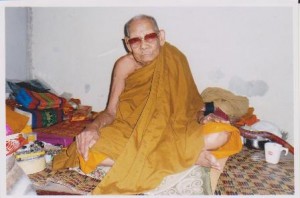
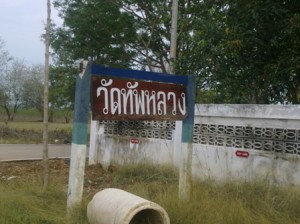
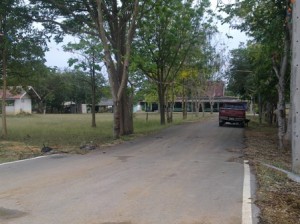
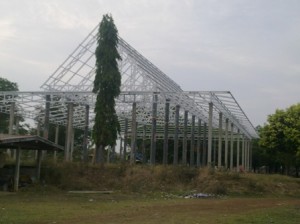
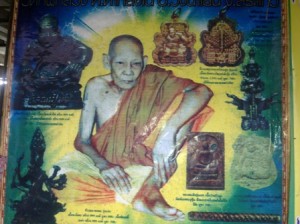

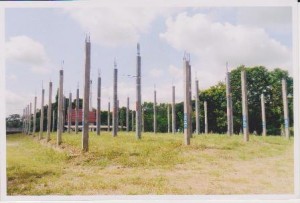
หลวงปู่บัว แก้วคง (ธมฺมรฺตโน)อายุ 86 ปี
Luang Poo Bua kaewkong 86 years old
วัดทับหลวง ทุ่งกบินทร์ ต.ตาหลังใน อ.วังน้ำเย็น จ.สระแก้ว
Wat tabluang tungkabin, tambon Talangnai, amphur Wangnamyen, Srakaew province
Luangpoo is the meditative monk during the times of Luangpoo Kumphan, he usually resides in forest or cave and has been doing so for several decades, he is also Vipassana student of Luangpoo Yai Phra Khru Thep Lok Udon. He has accomplished in Kasina meditation. Now he is very ill while he is constructing the education hall of the temple while this project still requires more funding support. So we are asking for your help. Donationcan be made to Wat Thap Luang, Tor Kor Sor Bank, Wang Nam Yen branch, account number 278-2-90806-1, please contact us here for additional information.
หลวงปู่บัวเป็นพระกัมมัฏฐานร่วมสมัยกับหลวงปู่คำพันธ์ เป็นพระสุปัฏติปัณโนผู้ใช้ชีวิตอยู่ตามป่าตามถ้ำ
มาหลายสิบปีเป็นลูกศิษย์ผู้ฝึกวิปัสนากัมมัฏฐานกับหลวงปู่ใหญ่ พระครูเทพโลกอุดร
ท่านมีพลังจิตแก่กล้าด้านกสิณน้ำ ตอนนี้ท่านกำลังอาพาธหนัก ท่านกำลังก่อสร้างศาลาการเปรียญของวัดยัง
ไม่แล้วเสร็จต้องการปัจจัยอีกจำนวนมากหากใครมีจิตศรัทธาร่วมบริจาคโอนเงินเข้า
ชื่อบัญชี วัดทับหลวง ธนาคาร ธกส. สาขาวังน้ำเย็น เลขที่ 278-2-90806-1
ติดต่อ พระอาจารย์ สวัสดิ์ สุขกาโม โทร.081-2631646
พระอาจารย์ อำนวย สุจิตโต โทร.080-6312920
สอบถามเส้นทาง คุณสิทธิชัย 089-7517812

Invitation to Dharma talk “Meditation in daily activities” By Phra Khru Pariyatsasanakhun abbot of Wat Thammawanaram (Thai temple in Hongkong)
The talk will focus on how to keep focused meditation while performing different activities.
(This Dharma talk will be in Thai with translation into English)
ขอเชิญพุทธศาสนิกชนทุกท่านร่วมฟังธรรม “จิต สงบ ด้วยใจภาวนาระหว่างการทำกิจกรรมต่างๆ”
สอนภาวนาโดย “ท่านพระครูปริยัติศาสนคุณ” เจ้าอาวาสวัดธรรมวนาราม(วัดไทหว่อ) ฮ่องกง
เรียนรู้วิธีเจริญสติ ภาวนาควบคู่กับการทำกิจกรรมต่างๆในชีวิตประจำวัน ในวันพฤหัสบดีนี้ 9 กุมภาพันธ์ 2555 เวลา 18.00น.-20.00น. ณ อาคารเวลคัม ติดสน. บางรัก ชั้น 12 (ตรงข้ามสำนักงานเขตบางรัก)
สำรองที่นั่ง contact ที่นี่ หรือ Mongkol Sri facebook page หรือโทร 081-9855564
Location
Welcome palace apartment (ram’s home). For directions please see below. Please feel free to call ram at 0819855564 orcontact us for more info and feel free to invite others who might be interested as well.
Date/Time: 6pm-8pm, Thursday 9th Feb 2012
RSVP: Please let us know if you’ll be coming by clicking “Attend” on the Mongkol Sri facebook page or send request in contact us
This event is free of charge suitable for everyone from beginner to advanced practitioner.
Please share this event with others who might be interested as well and if you wish, you could bring some vegetarian snacks and drinks which will be shared with others.
Directions
Welcome Palace apartment on Naret rd. (a one way street), off of Sriphraya road. If you are coming by Sub-way (easiest) you can take the Samyan station exit in front of the temple then catch a Taxi or take a Motorbike Taxi (20 Baht) from there by telling them to go to Bangrak Police station. If coming by BTS you can get off at Saladaeng station and take a taxi from there as well. You can just tell the taxi to come to the Bangrak police station if you are coming directly from elsewhere. Once at the police station, my building is an old white building just before the station, come on the 12th floor on the right side and you’ll see a big door and I’ll be in there. If you see a lot of Africans in the building it means that you are in the right building.
พุทธมามกมูลนิธิ ในพระสังฆราชูปถัมภ์
Buddhist foundation
ร่วมกับ
with
วัดเบญจมบพิตรดุสิตวนาราม
Bejamabophit temple
ขอกราบอาราธนาพระคุณเจ้า และเรียนเชิญพุทธศาสนิกชนผู้สนใจธรรมปฏิบัติร่วมฟังธรรมและปฏิบัติกรรมฐาน
Homage to the Buddha and inviting all Buddhists to listen to Dharma and practice meditation
ณ วัดเบญจมบพิตรฯ ศาลาธรรมชินราชปัญจบพิธ ดาดฟ้า ชั้น ๕
At Wat Benjamabophit temple, top floor 5th level
องค์แสดงธรรม คือ
With the following details
(all talks are in Thai)
พระอาจารย์คูณ ติกขวีโร วัดอุดมวารี อ.พาน จ.เชียงราย
วันอาทิตย์ที่ 12 กุมภาพันธ์ 2555 เวลา 14.00น.
พระอาจารย์ละมาย ลาภสัมปันโน วัดพระพุทธบาทดอยโล้น อ.บ้านตาก จ.ตาก
วันอาทิตย์ที่ 11 มีนาคม 2555 เวลา 14.00น.
พระอาจารย์ไม อินทสิริ วัดหนองช้าวคาว อ. กู่แก้ว จ.อุดรธานี
วันอาทิตย์ที่ 22 เมษายน 2555 เวลา 14.00น.
พระอาจารย์ไมตรี ฐิตปัญโญ วัดทางสาย อ.บางสะพาน จ.ประจวบคีรีขันธ์
วันอาทิตย์ที่ 20 พฤษภาคม 2555 เวลา 14.00น.
พระอาจารย์แปลง สุนทโร วัดป่าอุดมสมพร อ.พรรณานิคม จ.สกลนคร
วันอาทิตย์ที่ 10 มิถุนายน 2555 เวลา 14.00น.
ติดต่อ พรหมชัย เกษมวรกิจ 0800788077
| Dear Friends Near and Far,
First off, I would like to wish you all a very Happy New Year! I hope this new year brings you and your loved ones abundant joy and good health. Today being the first Guru Rinpoche Day message of the year 2012, I would like to share with you a teaching given by Nyoshul Khen Rinpoche many moons ago in Bhutan, perhaps the most memorable time of my life. Rinpoche besides being my root guru, was also like a father figure to me. I am where I am spiritually today only because of the kindness of my gurus.
One day in his audience, when he was talking about the Great Perfection, he gave me a piece of advice spreading out his five fingers in front of me and mentioned think of these as the five different motivations. He drew a line along his little finger and pointing to the lower half said, “One motivation we have is fear and the wish to be free from that fear in this life. For example, some people are sick or are experiencing some particular hardship and because of which, start practicing. That kind of intention is not very pure.” Pointing to the upper half of his little finger he said, “This is the desire to gain excellent qualities in this life. For intance, wanting to have good health, long life and so forth. Both of which are samsaric motivations” he said. The second finger Rinpoche mentioned is neither positive nor negative, but of a neutral intention. The middle finger he said is the motivation of those with inferior faculties, thinking, “I fear falling into the lower realms and instead want to be liberated from the lower realms and because of this reason I want to practice observing karma.” The next finger he said is the motivation of those with mediocre faculties, those at the Arhat level, who fear being in samsara. Finally pointing to the thumb he said, ” This is the motivation of those with superior faculties, the superior motivation of pure bodhichitta.” Pure compassion and wisdom. When these two are combined together then you have pure bodhichitta. When you lack one of these, it is not pure bodhichitta. So Rinpoche said, out of these five, which motivation should we have? This one, he said, with a big thumbs up.
Most of the time quite honestly speaking we have the lowest motivation. We have fear of suffering, obstacles and attachment to excellent circumstances and qualities. Sometimes we might reach the third or the fourth level, but then we fall back down again. We never reach the highest level. To close his advice, we mentioned, whoever you are and whatever practice you do, when you lack this superior kind of motivation that means you lack what? Enlightenment!
Sending you all much love and affection on this Guru Rinpoche Day.
Sarva Mangalam,
Phakchok Rinpoche |
|
|
|
| Dear Friends Near and Far,I hope you have all been happy and healthy. Unlike my previous messages, today I want to keep my message short and sweet, I hope.Whether you are a practicing buddhist or in some way associated with some element of it. Many a times we are caught up in doing something buddhist to a point where sometimes we even forget the ground on which we are tirelessly building.
The buddha taught that in order for one to realize enlightenment, one must develop two supreme qualities: wisdom and compassion. These two means for realizing enlightenment, works in unison and therefore can’t manifest without the other. So in practice, wisdom gives rise to compassion, and compassion gives rise to wisdom.
So on this Guru Rinpoche Day, I would like to ask you all to “practice a random act of kindness” without expecting anything in return, not even a simple thank you. And it is my hope that your compassionate act creates a ripple effect.
Keeping you all my heart and prayers.
Sarva Mangalam,
Phakchok Rinpoche
|
|
|
|

Dharma talk “Meditation in daily activities”
By Phra Khru Pariyatsasanakhun abbot of Wat Thammawanaram (Thai temple in Hongkong)
The talk will focus on how to keep focused meditation while performing different daily activities.
(This Dharma talk will be in Thai with translation into English)
Date: Wednesday 23rd November 2011 Time: 530pm-830pm at Ram’s place (directions are below) this event is free of charge and dinner will be provided
RSVP: Please click attend on facebook at https://www.facebook.com/event.php?eid=148494505249998 or contact us here or call 081-9855564
ขอเชิญพุทธศาสนิกชนทุกท่านร่วมฟังธรรม “จิต สงบ ด้วยใจภาวนาระหว่างการทำกิจกรรมต่างๆ”
สอนภาวนาโดย “ท่านพระครูปริยัติศาสนคุณ” เจ้าอาวาสวัดธรรมวนาราม(วัดไทหว่อ) ฮ่องกง
เรียนรู้วิธีเจริญสติ ภาวนาควบคู่กับการทำกิจกรรมต่างๆในชีวิตประจำวัน
ในวันพุธที่ 23 พฤศจิกายน 2554 เวลา 17.30น.-20.30น. ณ อาคารเวลคัม ติดสน. บางรัก ชั้น 12 (ตรงข้ามสำนักงานเขตบางรัก) ไม่มีค่าใช้จ่าย มีอาหารค่ำด้วย
สำรองที่นั่งใน facebook https://www.facebook.com/event.php?eid=148494505249998 หรือ อีเมล์ contact ที่นี่ หรือ โทร 081-9855564
Directions:
Welcome Palace apartment on Naret rd. (a one way street), off of Sriphraya road. If you are coming by Sub-way (easiest) you can take the Samyan station exit in front of the temple then catch a Taxi or take a Motorbike Taxi (20 Baht) from there by telling them to go to Bangrak Police station. If coming by BTS you can get off at Saladaeng station and take a taxi from there as well. You can just tell the taxi to come to the Bangrak police station if you are coming directly from elsewhere. Once at the police station, my building is an old white building just before the station, come on the 12th floor on the right side and you’ll see a big door and I’ll be in there. If you see a lot of Africans in the building it means that you are in the right building.
Map can be found at:
Welcome Palace apartment
ภาษาไทย ดูได้ที่นี่
Dear Friends Near and Far,Greetings to you all on this Guru Rinpoche Day. I hope you’ve all be healthy and happy.We all want to be happy. This is our fundamental aim in life, right? But often we find it difficult to achieve. When we don’t know how to deal with our own emotions and our mind then sometimes life can become very tiring and depressing. On top of that, most of us are so busy these days, which makes us even more stressed and uptight. So here I would like to share with you three simple ways that helps me deal with my emotions and thus gives me comfort.1. Creating Space
These days we have so many things to think about: our health, our family, our work, and if you’re a dharma practitioner, then on top of all that you have meditation and dharma practice to worry about. When we don’t know how to deal with them, these worries can make our minds start to slowly shrink, becoming more and more narrow, and as a consequence more and more negative. Sometimes things start to overwhelm us and we feel trapped physically. Our chest feels tight and then we let out a big sigh in an attempt to relieve ourselves of these feelings. That happens sometimes. A small problem can come to seem so big that we can’t deal with it at all.
A really good way to deal with this is to create space mentally. It helps relieve the tension and uptightness in your mind and in your body as well. Creating space is a very simple method. It’s not a Buddhist teaching or anything like that. It’s simply a technique we can apply to give ourselves space and freedom and relief from all our worrisome thoughts.
How to create space? When you have a few minutes, look ahead of you and simply imagine that you’re surrounded by empty space in all directions. Sometimes it is useful to look at the empty sky. Just imagine space everywhere: no walls, no boundaries, no buildings, nothing. And don’t start thinking about work, family, things you need to do. Simply imagine that everything is just like the vast, open sky, like empty space, and let your mind blend into the space so that it becomes just as vast and open. You can close your eyes if that helps. Imagine this spaciousness for a short while. After a minute or two you’ll start to really feel spacious mentally. Your chest will open up and you’ll feel relieved of all those tensions and thoughts that were crowding in on you just a few minutes ago. Your mind opens up and then your way of thinking changes, just like that. It takes just five or ten minutes and is so easy—that is the magic of creating space. You don’t have to believe me. Try it for yourself and you’ll see.
2. Knowing your own faults and Reducing Judgment
We all want to be happy, right? Yes or no? But what is our mind occupied with most of the time? Negative emotions, negative judgments, and negative thoughts. Look at your own mind and see the pattern of emotions. How many of them are negative? Have you ever before given this a moment’s thought?
So what you need to do first is to recognize your thought-patterns, your negative emotions and the way they arise, the way different feelings arise. Recognize, notice, but Don’t Judge. There’s a big difference between noticing and judgment. Noticing is simply recognizing and becoming aware of something: “Oh, yes, I have a problem with jealousy.” But judgment goes one step further—a step too far—and starts criticizing: “Oh, yes, I have a problem with jealousy. Oh my God, I’m such a bad person. I can’t believe I made that mistake! Oh, I feel so awful. I can’t bear it!….” Do you see the difference? Judgment has these emotional ties whereas noticing does not. So try to simply notice your faults and not judge.
The problem nowadays is not that people are not doing dharma or other spiritual practice and trying to improve. The problem nowadays is that we don’t notice and accept our own faults; so then of course we don’t improve, no matter how we might try. It’s a bit like taking medicine for an illness when you don’t even know what illness you have. So please give this a moment’s thought. Look honestly at yourself and acknowledge your own faults and mistakes.
3. Compassion and Loving Kindness
The third key I’d like to mention here is having compassion and loving-kindness. Traditionally speaking, in the Buddha’s teaching, compassion is defined as the wish for beings to be free from suffering and the cause of suffering and loving kindness is the wish for beings to have happiness and the cause of happiness. Here though, I’d like to explain compassion as meaning a basic understanding or empathy for others and loving kindness as meaning a good, kind heart.
Understanding is so important. For example, in order for a family to be happy and harmonious the parents need to understand their children, be able to see things from their point of view, and the children also need to understand their parents. It’s the same in all situations, in the office, other relationships and so on. We need to share with each other, get to know each other well, and learn to look at things from others’ perspectives; we need to put ourselves in their shoes. If somebody is shouting at you, do you think he’s happy? Do you think he’s enjoying that? No, he’s upset, stressed, and angry, and later on he might well feel a lot of regret for what he’s doing right now. Yes, many people make mistakes, but do you think they do so intentionally? Do you think they do so because they’re happy? No. So try to understand that instead of just reacting with more anger and judgment from your side. If you can do that, you’ll feel compassion.
Another aspect of compassion is that if you come to understand your own problems and gain some freedom from them, naturally compassion towards others will arise. On the other hand, when you don’t clearly notice your own problems in the first place and know what suffering you have then how can you have compassion for others? How can you wish others to be free from that suffering, suffering that you don’t even recognize clearly yourself? So first you need to see your own problem. How? When you create space, the first key, and gain some freedom from your stress and the onslaught of thoughts, you see what you’re getting out from, you see the benefits of how you become happier. From just the first point, creating space, you think, “Oh, my boss, poor guy. If he knew this method he would be in a much better place than he is now. The poor guy.”
When you have this kind of compassion, your mind becomes more and more loose. When you focus more on others, indirectly you’re reducing your focus to your ego and as a result your mind then becomes more and more relaxed, more expansive and then more intelligent. You can share these three points with anyone. It’s going to benefit them, not harm them. So these are the three keys to be happy.
Sending you all much love and affection.
Sarva Mangalam,
Phakchok Rinpoche |
|
|
|
กุญแจสู่ความสุข
แด่สหายทั้งหลายที่อยู่ใกล้และอยู่ไกล สวัสดีทุกท่านเนื่องในวันคุรุรินโปเช หวังว่าทุกท่านคงมีสุขภาพที่ดีและมีความสุข เราทุกคนล้วนต้องการจะมีความสุข สิ่งนี้คือเป้าหมายพื้นฐานในชีวิตเราจริงหรือไม่? แต่บ่อยครั้งที่เรารู้สึกว่าเป็นการยากลำบากเหลือเกินที่จะเข้าถึงความสุข เมื่อใดก็ตามที่เราไม่รู้ว่าจะรับมือกับอารมณ์และจิตใจของเราอย่างไร เมื่อนั้นเราจะรู้สึกว่าชีวิตช่างน่าเหนื่อยหน่ายและตึงเครียด ด้วยเหตุนั้นในที่นี้ข้าพเจ้าจึงอยากมีส่วนร่วมกับท่านทั้งหลายในวิถีทางสามเรื่องง่ายๆ ที่ช่วยให้ข้าพเจ้าสามารถจัดการกับอารมณ์และความรู้สึกของข้าพเจ้า ซึ่งทำให้ข้าพเจ้าสุขสบายอยู่เสมอ
ทุกวันนี้เรามีสิ่งที่ต้องคิดคำนึงถึงมากมายเหลือเกิน ทั้งเรื่องสุขภาพ ครอบครัว หน้าที่การงาน และถ้าท่านเป็นผู้ฝึกปฏิบัติธรรมด้วยแล้วท่านยังมีภาระในการทำสมาธิและฝึกปฏิบัติธรรมที่ต้องเป็นห่วงอีก เมื่อใดก็ตามที่เราไม่รู้ว่าจะจัดการกับมันอย่างไรความกังวลนี้จะทำให้จิตใจของเราหดตัวลงที่ละน้อยๆ และมีขนาดแคบลงๆ ผลลัพธ์ที่เกิดขึ้นจะเป็นไปในทางเลวร้ายยิ่งขึ้นเรื่อยๆ จนบางครั้งดูเหมือนว่าสิ่งต่างๆ เริ่มท่วมท้นหนักหน่วงจนรู้สึกเหมือนกำลังติดกับดักและยังรู้สึกแน่นหน้าอก เราจะแสดงออกอย่างชัดเจนถึงความพยายามที่จะผ่อนคลายตัวเองจากความรู้สึกเหล่านั้น สิ่งนี้คงเกิดขึ้นกับเราบ้างในบางครั้งไม่มากก็น้อย แต่เรื่องเล็กๆ เหล่านี้ก็อาจกลายเป็นปัญหาใหญ่ที่เราไม่สามารถจัดการกับมันได้
วิธีการที่ยอดเยี่ยมประการหนึ่งในการจัดการกับสิ่งเหล่านี้คือการสร้างพื้นที่ว่างทางจิตใจขึ้น วิธีนี้จะช่วยปลดปล่อยอกุศลเจตนาและความตึงเครียดทั้งในจิตใจเช่นเดียวกับในร่างกายของท่าน การสร้างพื้นที่ว่างมีวิธีการที่ง่ายมาก มันไม่ใช่การสอนคำสอนทางพุทธศาสนาหรืออะไรทำนองนั้น หากเป็นเทคนิคง่ายๆ ที่เราสามารถประยุกต์ใช้กับพื้นที่ว่างและอิสรภาพของเรา และปลดปล่อยเราจากความกังวลทั้งมวล
แล้วเราจะสร้างที่ว่างได้อย่างไร? หากท่านมีเวลาสักเล็กน้อยลองมองตรงไปข้างหน้าและจินตนาการว่าท่านกำลังถูกล้อมรอบด้วยที่ว่างทุกทิศทุกทาง หากจำเป็นบางครั้งก็อาจใช้วิธีมองขึ้นไปบนท้องฟ้าที่ว่างเปล่า เพียงแค่จินตนาการว่าทุกหนทุกแห่งล้วนเป็นที่ว่าง ไม่มีกำแพง ไมมีขอบเขต ไม่มีตึกรามบ้านช่อง ไม่มีอะไรเลย และอย่าเริ่มต้นคิดถึงการงาน ครอบครัว คิดถึงเฉพาะสิ่งที่ท่านต้องการจะทำ จินตนาการง่ายๆ ว่าทุกสิ่งทุกอย่างล้วนเป็นพื้นที่ว่างกว้างใหญ่ ฟ้าโปร่งเหมือนที่ว่าง และปล่อยให้จิตใจของท่านผสมกลมกลืนไปกับพื้นที่ว่างดังกล่าวจนกลายเป็นพื้นที่ว่างและเปิดโล่งสุดลูกหูลูกตา ท่านอาจจะหลับตาลงหากสิ่งนี้ช่วยท่านได้ จินตนาการถึงความว่างเปล่านี้สักอึดใจหนึ่ง หลังจากเวลาผ่านไปสักนาทีหรือสองนาทีท่านจะเริ่มรู้สึกถึงความว่างในจิตใจอย่างแท้จริง หน้าอกของท่านจะโล่งและท่านจะรู้สึกถึงความผ่อนคลายจากความตึงเครียดในหัวท่านก่อนหน้านี้ จิตใจของท่านจะเปิดออกเช่นเดียวกับวิธีคิดของท่านที่จะเปลี่ยนไปเช่นกัน ขั้นตอนเหล่านี้ใช้เวลาไม่มากเลยเพียงห้าหรือสิบนาทีและยังง่ายมากด้วย นั่นแหละคือความวิเศษของการสร้างที่ว่าง ท่านไม่จำเป็นต้องเชื่อฉันแต่ลองดูด้วยตนเองแล้วท่านจะรู้สึกได้ด้วยตนเอง
- 2) เรียนรู้ข้อผิดพลาดของตนเองและลดการตัดสิน
เราทุกคนล้วนต้องการจะมีแต่ความสุขจริงหรือไม่ แต่อะไรคือสิ่งที่จิตใจของเรายึดติดอยู่ตลอดเวลา? นั่นคือความรู้สึกในด้านลบ การตัดสินในเด้านลบ และความคิดในด้านลบ ลองย้อนมองเข้าไปในจิตของท่านและศึกษาถึงรูปแบบของอารมณ์ดังกล่าวว่ามีมากน้อยเพียงใดที่อยู่ในด้านลบ ท่านเคยคำนึงถึงเรื่องนี้สักเล็กน้อยบ้างไหม?
ดังนั้นสิ่งที่ท่านต้องทำประการแรกคือตระหนักและยอมรับในรูปแบบหรือกระบวนการความคิดของท่าน โดยเฉพาะอย่างยิ่งความรู้สึกในด้านลบของท่านและกระบวนการที่ก่อให้เกิดความรู้สึกดังกล่าว หรือกระบวนการที่ความรู้สึกต่างๆ บังเกิดขึ้น การยอมรับในที่นี้คือการสังเกตเห็นโดยไม่ต้องตัดสินอะไรใดๆ ทั้งสิ้น เป็นเรื่องสำคัญที่จะต้องทราบถึงความแตกต่างระหว่างการสังเกตเห็นกับการตัดสิน การสังเกตเห็นคือการตระหนักถึงสิ่งใดสิ่งหนึ่งอย่างเรียบง่าย เช่นคำกล่าวว่า “โอ้ ใช่เลย ฉันมีปัญหากับความเป็นคนขี้อิจฉาของฉัน” ส่วนการตัดสินมักจะก้าวเลยไปก้าวหนึ่งเสมอซึ่งส่งผลไปสู่การวิพากษ์วิจารณ์ชี้ถูกชี้ผิด ดังประโยคที่กล่าวว่า “โอ้ ใช่เลย ฉันมีปัญหากับความขี้อิจฉาของฉัน ฉันมันเลวสิ้นดี ไม่น่าเชื่อว่าฉันจะทำผิดพลาดได้เช่นนั้น โอ้ ฉันช่างงี่เง่าจริงๆ ทนไม่ไหวแล้ว…” ท่านเห็นความแตกต่างดังกล่าวบ้างไหม การตัดสินนั้นเกี่ยวข้องกับอารมณ์ขณะที่การสังเกตเห็นนั้นไม่ ดังนั้นให้ท่านหัดสังเกตง่ายๆ ถึงความผิดพลาดของท่านโดยไม่จำเป็นต้องตัดสิน ปัญหาทุกวันนี้ไม่ใช่เรื่องที่เราหันหลังให้กับการปฏิบัติธรรมหรือการฝึกฝนทางจิตต่างๆ หรือมีปัญหาที่ต้องพยายามปรับปรุงให้ดีขึ้น ไม่ว่าเราจะพยายามอย่างหนักมาแล้วเพียงไรก็ตาม เพราะนั่นเปรียบเสมือนการกินยารักษาโรคโดยที่ยังไม่รู้ว่าตนป่วยด้วยสาเหตุใด ดังนั้นโปรดหยุดคิดสักนิดหนึ่งโดยการหันเข้าไปมองตนเองด้วยความสัตย์จริงว่าเรามีข้อผิดพลาดอะไรบ้าง
กุญแจสำคัญดอกที่ 3 ที่ฉันอย่ากจะกล่าวถึงในที่นี้คือความกรุณาและเมตตา ถ้าถือตามหลักเกณฑ์คำสั่งสอนในพุทธศาสนา กรุณาหมายถึงความปรารถนาที่จะให้สรรพสัตว์เป็นอิสระจากความทุกข์และเหตุแห่งความทุกข์ และเมตตาก็คือความปรารถนาที่จะให้สรรพสัตว์มีความสุขและเหตุของความสุข ในที่นี้ฉันจึงอยากจะอธิบายว่ากรุณาหมายถึงความเข้าใจพื้นฐานหรือการเห็นอกเห็นใจผู้อื่น ขณะที่เมตตาหมายถึงการมีจิตใจดี
ความเข้าใจเป็นสิ่งสำคัญอย่างยิ่ง ตัวอย่างเช่นในครอบครัวที่มีความสุขและปรองดองกัน บิดามารดาก็จำเป็นต้องเข้าใจบุตรหลานของตน ต้องมองสิ่งต่างจากมุมมองของพวกเขา และบุตรหลานก็จำเป็นต้องเข้าใจผู้ปกครองของตนในทำนองเดียวกัน ความสัมพันธ์เช่นนี้สามารถสร้างขึ้นได้ในทุกสถานที่และทุกเวลาไม่ว่าจะเป็นในที่ทำงานหรือเป็นความสัมพันธ์ชนิดอื่นๆ ก็ตาม เราจำเป็นต้องมีการแลกเปลี่ยนซึ่งกันและกัน พยายามทำความรู้จักซึ่งกันและกัน และหัดมองสิ่งต่างๆ จากมุมมองของผู้อื่น พูดอย่างติดตลกได้ว่าเราต้องหัดใส่รองเท้าของคนอื่นบ้าง หากมีใครมาตะโกนด่าว่าคุณคุณจะคิดว่าเขากำลังมีความสุขอยู่หรือ? คุณคิดว่าเขาสนุกกับการกระทำเช่นนั้นหรือ? เปล่าเลย เขากำลังกลัดกลุ้ม เครียด และโกรธ แต่เมื่อเวลาผ่านไปเขาจะรู้สึกเสียใจไม่น้อยกับการกระทำของตัวเอง ใช่แล้วหลายคนทำผิดพลาด แต่ท่านคิดว่าเขาใช้อารมณ์มากเกินไปหรือเปล่า? ท่านคิดว่าเขาทำลงไปเพราะเขามีความสุขหรือ? ไม่เลย ดังนั้นท่านควรพยายามใช้ความเข้าใจแทนที่จะมีอารมณ์โกรธตอบและด่วนตัดสินจากมุมมองของท่าน ถ้าท่านปฏิบัติได้ดังนี้ก็ถือได้ว่าท่านมีความกรุณาแล้ว
ในอีกมุมหนึ่งของความกรุณาก็คือหากท่านสามารถเข้าใจถึงปัญหาทั้งหลายของตัวเองและสามารถปลดปล่อยตนเองจากสิ่งเหล่านั้นได้ ความกรุณาต่อผู้อื่นก็จะเพิ่มขึ้นโดยอัตโนมัติหรือโดยเป็นธรรมชาติ ในทางตรงกันข้ามหากท่านไม่สามารถจัดการกับข้อสังเกตในปัญหาของท่านเอง ณ ที่ที่มันก่อตัวขึ้น และรู้ว่าท่านต้องทุกข์ทนอย่างไร แล้วท่านจะมีความกรุณาต่อผู้อื่นได้อย่างไร ท่านจะหวังให้ผู้อื่นเป็นอิสระจากความทุกข์ได้อย่างไร ความทุกข์ซึ่งท่านเองยังไม่แม้แต่จะตระหนักรู้โดยชัดเจนได้ ดังนั้นสิ่งแรกสุดคือการมองเห็นปัญหาของตนเอง คำถามต่อมาคือแล้วอย่างไร? เมื่อท่านสร้างพื้นที่ว่างซึ่งเป็นกุญแจประการแรกสำเร็จ และค้นพบอิสระจากความเครียดและการจู่โจมของความคิดต่างๆ ท่านจะเห็นได้ว่าท่านสามารถพ้นออกมาจากสิ่งใด ท่านเห็นถึงคุณประโยชน์ว่าท่านมีความสุขได้อย่างไร จากจุดแรกสุดคือการสร้างพื้นที่ว่าง ท่านจะคิดใหม่ว่า “โอ้ หัวหน้า ถ้าเขาทราบวิธีการนี้เขาจะดีขึ้นกว่านี้มาก คนน่าสงสาร”
เมื่อใดก็ตามที่ท่านมีความกรุณาเช่นนี้จิตใจของท่านก็จะเบาและเป็นอิสระขึ้นเรื่อยๆ เมื่อใดก็ตามที่ท่านหันไปเพ่งพิจารณาถึงคนอื่นๆ แทนที่จะเป็นเรื่องของตัวเอง ท่านจะสามารถลดอัตตาหรืออีโก้ลง ผลที่ได้ต่อจิตใจของท่านก็คือความผ่อนคลายที่เพิ่มมากขึ้น รู้สึกเปิดกว้างขึ้น และปัญญาเพิ่มพูนมากขึ้น ท่านสามารถแลกเปลี่ยนกุญแจทั้งสามนี้กับคนอื่นๆ ต่อไปเพราะเป็นสิ่งที่มีแต่คุณประโยชน์ไม่เป็นพิษภัยต่อพวกเขา และนี่คือกุญแจสามดอกไปสู่ความสุข
ด้วยความรักและปรารถนาดี
สรรวะมังคะลัม
พักชก รินโปเช (Phakchok Rinpoche)
